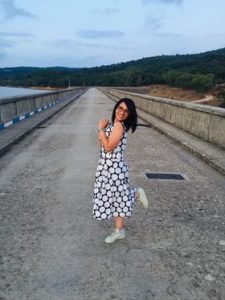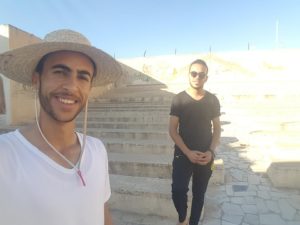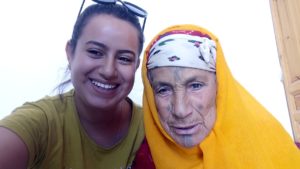A crisis challenges people, but it can be a chance! Corona hit us hard and unexpected. In March, we still have been convinced that we could simply postpone our cancelled fieldtrip to the time “after the pandemic”. In June, however, we realized that we would have to look for new horizons. Conducting online interviews was no option – we needed people on site.
Gladly friends and those who became friends over the course of the work helped us out. Welcome to our new colleagues Rawaa and May from Gafsa, Wiss from el Kef, Yosra from Siliana, Sarah from Tunis as well as Khayri, Nidhal and a further new colleague from Kasserine! Moreover, the Austrian Embassy in Tunis kept on supporting the TUNOCENT field research and thus, the entire project.
 “It was a great experience to be part of the TUNOCENT project. Even though creating a relaxed atmosphere and encouraging people to talk was not easy, it deserves the try! I had the chance to meet exceptional people; the beautiful thing is the paradox between the happiness of the people I met and the lack of comfort that they are facing. The extraordinary beauty of those places in my precious country amazed me. Finally, I want to thank you for this opportunity even though it was only for a short period but it was remarkable for me.” (Sarah)
“It was a great experience to be part of the TUNOCENT project. Even though creating a relaxed atmosphere and encouraging people to talk was not easy, it deserves the try! I had the chance to meet exceptional people; the beautiful thing is the paradox between the happiness of the people I met and the lack of comfort that they are facing. The extraordinary beauty of those places in my precious country amazed me. Finally, I want to thank you for this opportunity even though it was only for a short period but it was remarkable for me.” (Sarah)
While our actual researcher team kept themselves busy with explaining, coordinating and managing, their new colleagues found themselves facing the challenging job of field research. Despite being locals, it proved difficult to them, too. Although the interviewers were Tunisians, some people used standard Arabic even after being reminded to talk in their local dialect multiple times, Wiss reports. Others, in turn, were unable to translate the requested sentences because of their different education levels.
 “Some persons were difficult to deal with, others were more friendly and open minded.” (Khayri)
“Some persons were difficult to deal with, others were more friendly and open minded.” (Khayri)
“I learnt to exercise patience and got to know many new people. Being part of the TUNOCENT team was an honour for me and made me happy!” (Yosra)
For other people the recordings simply took too much time and concentration. Many people for instance did not understand what a dialectal research is about and doubted in it, Wiss explains. Convincing people to cooperate was a difficulty in this job, Nidhal agrees. Yosra continues that some people even associated her with politics and suspected her to work as politician. May shares this experience:
“I am very happy to be a part of the TUNOCENT team. In fact, it gave me the opportunity to discover new places in my country. It is each time an adventure: I listen to new stories about the history of the places and very amusing myths. Also meeting new different people and watch their behavior, live with them their daily life and taste their traditional food was so fun for me. Despite these pleasing parts, I have faced some problems. At the beginning 15 hours seemed so easy to collect but then I discovered is not easy at all. In fact, it is not that evident to find someone who wants to talk for more than 30 minutes. Finding the perfect environment (no noise, no children …) for the recording is very hard, too. Still, the most annoying thing is explaining people that you are not a spy.” (May)
This attitude complicated the matters. As male researchers, Khayri and Wiss experienced also women’s refusal of recording. Furthermore, all our new colleagues had struggles with the transportation. Nevertheless, Rawaa, May, Wiss, Khayri, Yosra, Sarah and Nidhal eventually were very glad to be part of our team. They gained exciting experiences and shared their best moments with us.
 “I liked this work very, very much because I got to know a lot of things about my country of which I was not aware before. Even customs from other places that are not far from my hometown were new to me! Moreover, I got in touch with very kind new people!” (Rawaa)
“I liked this work very, very much because I got to know a lot of things about my country of which I was not aware before. Even customs from other places that are not far from my hometown were new to me! Moreover, I got in touch with very kind new people!” (Rawaa)
“I very much enjoyed listening to the stories of elders. Thereby, I learnt new things and got insights about how my own people used to live in previous times. Also, I joked with the interviewees and we had fun.” (Wiss)
Nidhal describes his job experience as a change of perspective. Learning about the life of locals in his own region, he started to focus on details.
“This job is an amazing experience for me. It opens my eyes as I am going through a journey of self-discovery. I feel like an alien trying to learn about life here. Words cannot capture my gratitude for this opportunity. I won’t look at my country the same way as I did before.” (Nidhal)

